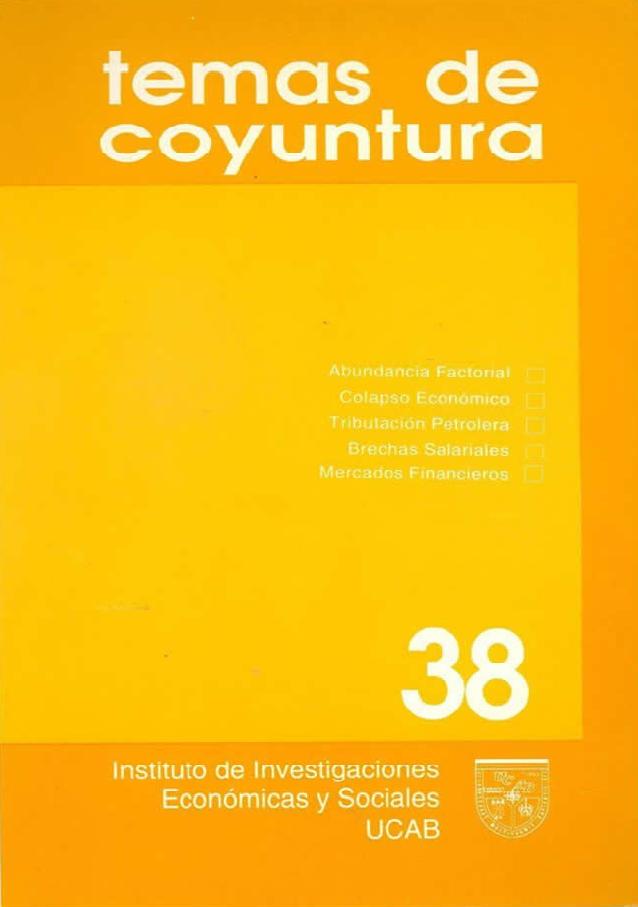Consideraciones para una revisión de la tributación petrolera venezolana
Resumen
Recientemente se celebró en el Banco Central de Venezuela un foro para revisar alternativas al actual marco tributario del sector petrolero venezolano. El presente trabajo hace una revisión de la literatura existente sobre las distintas consideraciones que hay que tener para dicha revisión. Primero comienza estudiando el problema en sí que enfrenta el productor de petróleo. De allí concluimos que la actual estructura presenta importantes distorsiones. Luego se analiza el problema que origina el hecho del tamaño relativo del sector petrolero en Venezuel. Usando un modelo y viendo la experiencia en otros países, encontramos que el sector petrolero( y por lo tanto el diseño de los impuestos al mismo) tiene un impacto en la forma como el shock de los precios del petróleo se transmite al tipo de cambio real. Esto puede tener consecuencias negativas en términos de crecimiento.Descargas
Citas
EMERSON, C. and R. Gamaut, 1984, Mineral leasing policy: competitive bidding and
the resource rent tax given various responses to risk, The Economic Record
, 1 33- 142.
BARRO, R. y X. Sala-i-Martin, 1995, Economic Growth (McGraw Hill, New York)
GARNAUT, R. and A, Clunies, 1975, Uncertainty, risk aversion and the taxing of
natural resource projects, The Economic Journal 85, 272-287.
GARNAUT, R. and A. Clunies. 1979. The neutrality of the resource rent tax, The
Economic Record 55, 193201.
GIAVAZZI, F.. Sheen, J . and C. Wyplosz, 1938, The real exchange rate and the fiscal
aspects of a natural resource discovery. Oxford Economic Paper: 40, 427-
HOTELLING. 1931, The economics of exhaustible resources. Journal of Political
Economy 39, 137-175.
HEAPS, T. and F. Helliweel, 1985, The Taxation of Natural Resources, in: A. Aurbach
and M. Feldslein, eds., Handbook of Public Economics Volume I (North—
Holland. Amsterdam).
J OHNSTON, D., 1994. Petroleum, Fiscal Systems and Production Sharing Contracts
(PennWell Books, Tulsa)
KARP, L. and J. Livernois, 1992, On efficiency-inducing taxation for a non-renewahle
resource monopolist, Journal uf Public Economic: 49, 219139,
KEMP, A. 1989, Development risks and petroleum fiscal systems: A comparative study
of the UK, Norway, Denmark and the Netherlands, The Energy Journal 13.
KEMP. A. and D. Rose, 1984, Investment in oil exploratiun and production: The
comparative influence of taxation, in: D. Pearce, H. Siebert and I. Walter,
Risk and the political economy of resource development (St. Marlin Press,
New York).
KRAUTKRAEMER, 1.. 1990, Taxation, ore quality selection, and the depletion of a
heterogeneous deposit of anon-renewable resource, Journal ofEnvironmental
Economics and Management 18, 120-1354
LIVERNOIS J., 1991, A note on the effect of tax brackets on non-renewable resource
extractiort, Journal of Envímnmenlal Economics and Management 22, 272-
MANZANO, 0,, 1998. Oil Tax in Venezuela and Investment lncentives. Mimea, MIT.
MANZANO, O. 1999. Oil Tax Systems, Price Shocks and Investment Behavior: An
Empirical Study. Mimeo, MIT,
MANZANO, 0. 199%. A General Equilibrium Approach to Oil Taxation. Mimeo,
MIT.
Oficina del Economista Jefe de PDVSA, 1998. El Marca Fiscal Petrolero Venezolana,
Evolución y Perspectivas. Presentacion en el Banca Central.
ROMER. P.. 1990, Endogenous Technological Change. Journal of Polilical Ecunamy,
5, pat II, 571-5102
ROSE, A” STEVENS, B, and G. DAVIS, 1984, Natural Resource Policy and Incame
Distribution (The John Hopkins University Press, Baltimore).
ROWSE 1.. 1997, On ad valorem Iaxation of nonrenewable resource production.
Resource and Energy Ecanamics 19, 221-239,
SACHS and WERNER (1995). Natural Resource Abundance and Ecnnomic Growth.
NBER Working Papers S398.
SANSING, K., 1993, A note on alternative perroleum taxation, Resource and Energy
Economics 15, 243-246.
SEMMLER, W., 1994, On the optima] regulation of an extractive industry. Journal of
Ecanomícs and Business 46, 409-420.
SIBLEY, D., 1989, Asymmetric information, incentives and price-cap regulation,
RAND Journal of Ecanamícs 20, 392-404.
SPIEGEL, Y., 1996, The choice of technology and capital structure under rate
regulation, International Journal uf Industrial Organization 15, 191416.
TRAIN, K., 198?, Optimal Regulation, the economic them): of natural munopoly (MIT
Press. Cambridge. MA),
VOGELSAND. 1., 1988. A little paradox in the design of regulatory mechanisms,
Inremarianal Economic Review 29, 467-476.
ZHANG, L., 1997, Neutrality and efficiency of petroleum revenue tax: A theoretical
assessment, The Economic Journal 107, 11064120.





.png)



